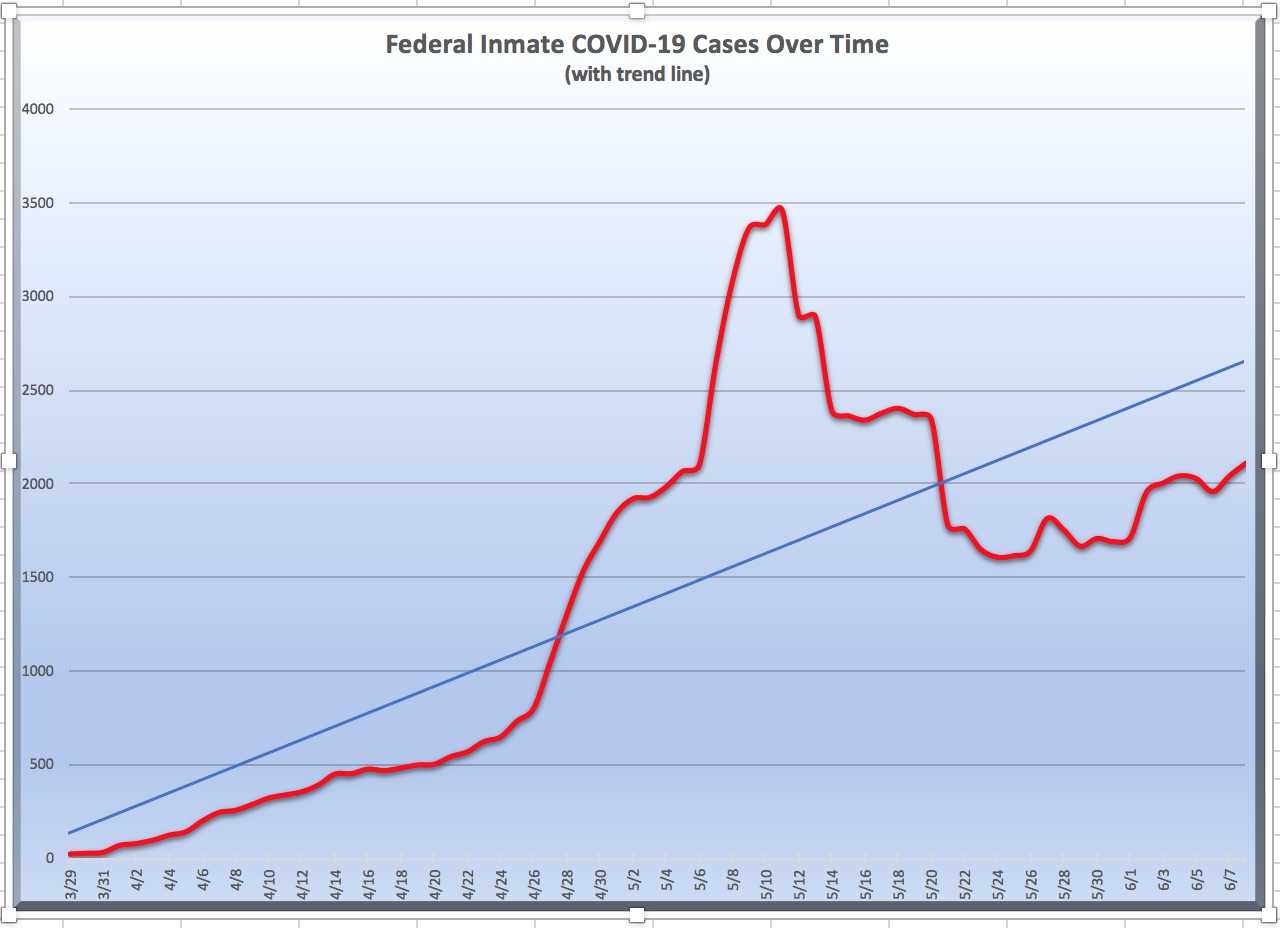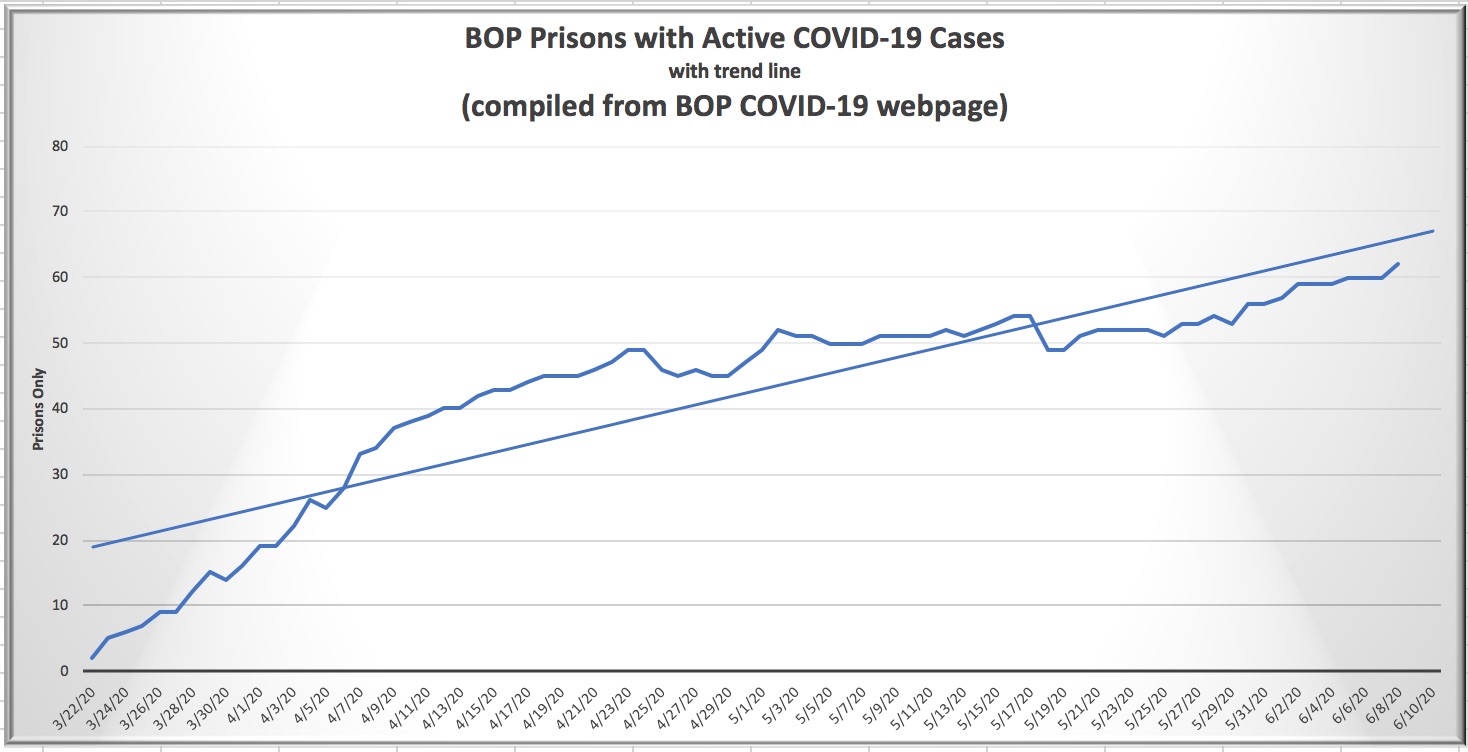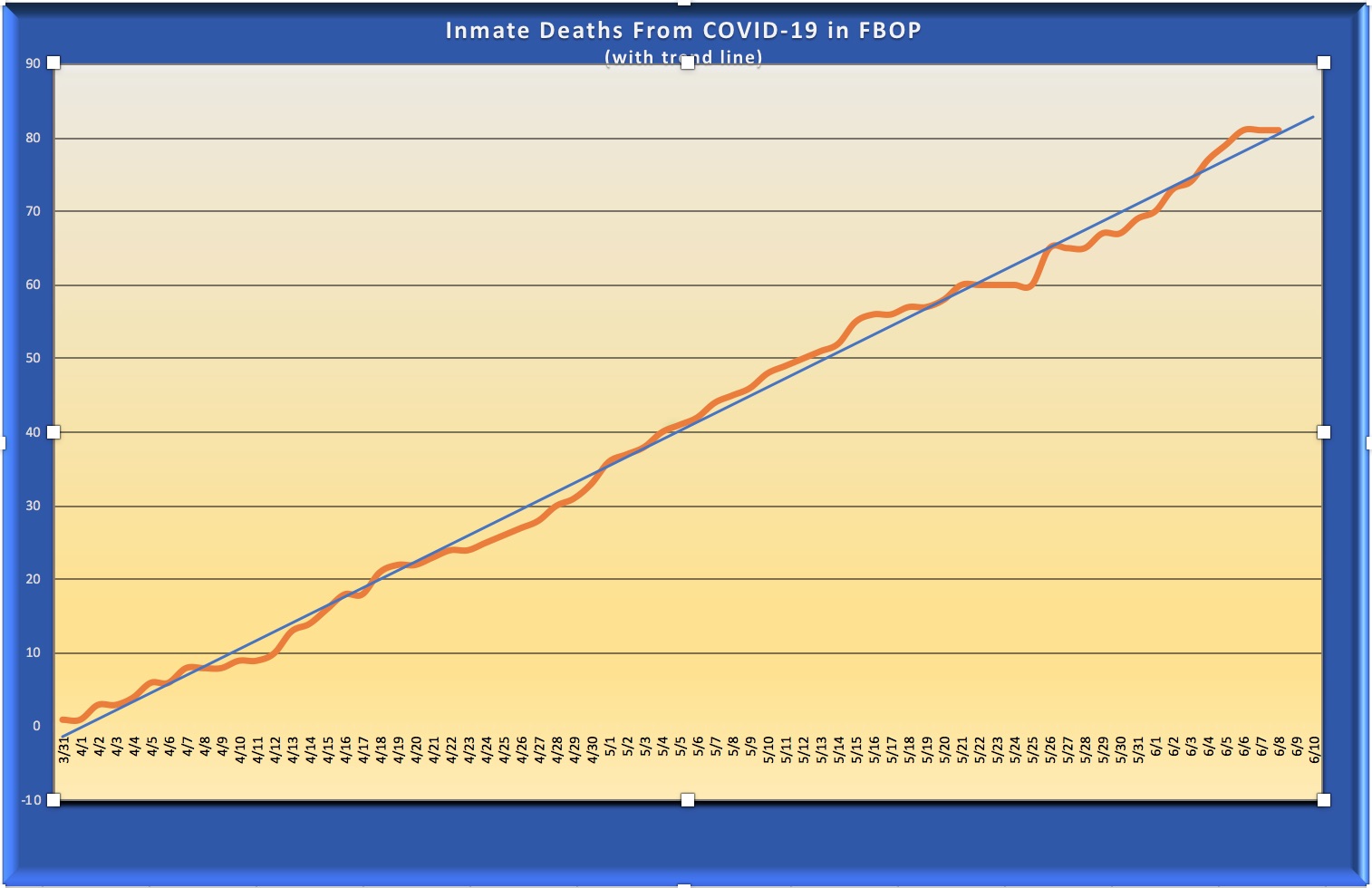We post news and comment on federal criminal justice issues, focused primarily on trial and post-conviction matters, legislative initiatives, and sentencing issues.

COVID-19 ROUNDUP
Talk about illness… Everyone’s sick to death about COVID-19 talk. But wishing it gone is a little bit different than having it gone. That’s somewhat the problem that the Federal Bureau of Prisons has with the coronavirus in general, and that BOP Director Michael Carvajal has with it in particular.
The BOP’s active coronavirus count jumped 23% this past week, from 1,710 sick inmates on June 1 to 2,109 yesterday. Staff infection ticked up from 171 to 185, and the number of BOP facilities reporting the virus jumped 7%, from 57 to 62. Cumulative inmate COVID-19 deaths increased last week from 70 to 81.
 The numbers keep ticking up, and – what’s worse – at the same pace. Nevertheless, when the Senate Judiciary Committee held a hearing a week ago today, Director Carvajal told the senators that “at this point, we have more recoveries than new infections. I believe that this shows that we are now flattening the curve.”
The numbers keep ticking up, and – what’s worse – at the same pace. Nevertheless, when the Senate Judiciary Committee held a hearing a week ago today, Director Carvajal told the senators that “at this point, we have more recoveries than new infections. I believe that this shows that we are now flattening the curve.”
That’s not what flattening the curve means. “Flattening the curve” means to stagger the number of new infections over a longer period of time, although I suppose that eventually – when the BOP runs out of inmates yet to be infected – the curve will necessarily flatten when there’s no one left to get sick. But whatever else is happening, the BOP’s curve is not flattening.
Something else that’s not happening is a decrease in inmate class actions against the BOP. Those are proceeding apace around the country:
Massachusetts: A class of inmate plaintiffs who had conditions identified by the Centers for Disease Control and Prevention that heightened their risk for contracting COVID-19 or having a worse outcome from it (the “medically vulnerable”) sued the Federal Medical Center at Devens, Massachusetts, seeking proper and complete home confinement relief from the administration there. The Massachusetts federal district court denied the inmates an emergency injunction in May, but they asked for reconsideration last week. The court had denied the injunction in part because there had only been a single COVID-19 case at Devens when the injunction was denied. But since then, 24 inmates have been diagnosed as having the virus.
The injunction was also denied because the BOP had convinced the judge that it was “immediately reviewing all inmates who have COVID-19 risk factors… to determine which inmates are suitable for home confinement.” But then Devens’ warden, testifying in a different proceeding last month (one seeking compassionate release for an inmate), admitted that medical vulnerability to COVID-19 has not been considered a factor by the Devens front office in its compassionate release decisions, and that Devens refuses to transfer any prisoner to home confinement due to COVID-19, regardless of age or medical vulnerability, until the prisoner has served at least 50% of his sentence or at least 25% of his sentence with under 18 months left to serve.
The judge who originally heard the warden’s testimony in the compassionate release action found the policy to be “utterly inconsistent” with the Attorney General’s direction to maximize the use of home confinement as a tool to combat COVID-19, leaving “at-risk inmates who are not being individually assessed for release. And some of them may get very sick. Some of them may die.”
That reconsideration motion is pending.
Connecticut: In litigation over FCI Danbury, the judge has ordered the parties to give inmates a release form that would let the court release their presentence reports to the plaintiffs’ lawyers. The plaintiffs say access to the PSRs – which include a section on the defendants’ medical conditions – would help inmates vulnerable to the virus.
New York: U.S. District Judge Edgardo Ramos was preparing to rule on an inmate motion for injunction after a doctor tasked with inspecting MCC New York issued a scathing report proclaiming basic sanitation and virus screening failures. In a May 26 filing, Dr. Homer S. Venters criticized poor inmate screening and concluded that the prison has “ignored” signs that the virus may be widespread. Dr. Venters also reported a lack of access to basic sanitation, including soap. and he saw evidence that the facility is “widely infested with mice and roaches.”
Ohio: The FCI Elkton injunction came to a screeching halt after the BOP went back to the Supreme Court last week and this time convinced Associate Justice Sonia Sotomayor to grant its stay request. The Northern District of Ohio injunction issued by Judge James Gwin is now on hold, pending an appeal to the 6th Circuit Court.
North Carolina: An inmate suit over conditions at the several prisons making up the Butner Federal Correctional Complex, like the ones in Massachusetts, Ohio and Connecticut, seeks a court order that the Butner administration accelerate home confinement and compassionate release due to the rampant coronavirus at Butner (which has 571 active inmate cases and 18 deaths).
The BOP has moved to dismiss the suit, arguing that things are not as bad as the plaintiffs say they are because a lower percentage of infected inmates are dying than victims in the general public. Yesterday, the inmates replied,
More than 900 men incarcerated at Butner—almost 21 percent of Butner’s population—have tested positive for the virus that causes COVID-19. Nineteen people (including a BOP staff member) have died1—far more than at any other BOP facility. Half of those deaths happened in the 13 days since Petitioners filed this lawsuit. Infections and deaths are rapidly rising. The situation gets worse by the day.
Despite these harrowing and undisputed facts, Respondents contend that “FCC Butner’s efforts have been effective in managing infections and treating inmates.” Because they have purportedly taken some steps to mitigate the spread (however ineffective and late), Respondents argue their response to this deadly outbreak cannot possibly be deemed constitutionally defective. But that is not the law.
California: The inmates in a habeas corpus action against FCI Terminal Island and FCC Lompoc have asked the Central District of California federal court to order “a highly expedited process — for completion within no more than 48 hours — for BOP to use procedures available under the law to review members of the Class for enlargement of custody… in order to reduce the density of the prison population… and subsequently ordering the release of those granted temporary enlargement.” Separately, the complaint requests injunctive relief under the 8th Amendment to order improved conditions for all prisoners remaining at the institutions in the form of social distancing and provision of hygiene products.

The BOP has moved to dismiss the California suit for the same reasons it has raised elsewhere, that the court lacks the power to grant the asked-for relief and that the plaintiffs have not exhausted remedies. The court should decide the issue this week.
Grinis v. Spaulding, Case No 1:20cv10738 (D. Massachusetts)
Martinez-Brooks v. Easter, Case No 3:20cv569 (D Connecticut)
Hallinan v. Scarantino, Case No 5:20hc2088 (Eastern District of North Carolina)
Wilson v. Williams, Case No 4:20cv794 (Northern District of Ohio)
Fernandez-Rodriguez v. Licon-Vitale, Case No 1:20-cv-03315 (Southern District of New York)
Wilson v. Ponce, Case No 2:20cv4451 (Central District of California)
– Thomas L. Root



